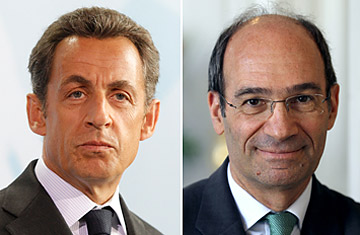
(L) French President Nicolas Sarkozy (R) French Labor Minister Eric Woerth
When French unions lead what are likely to be several million angry workers through the streets Sept. 7 in nationwide demonstrations against looming pension reform, they won't only be denouncing the measure's plans to extend the retirement age. Many of the marchers will also be decrying President Nicolas Sarkozy's insistence that Labor Minister Eric Woerth continue to navigate implementation of the new policy despite his ensnarement in a growing scandal involving billionaire L'Oréal heiress Liliane Bettencourt, party financing and conflicts of interest. As the week closes out with confounding new revelations around the affair, unions complain that Woerth has become so discredited they no longer view him as a credible negotiator. And it suddenly looks like a reform that is key to Sarkozy's re-election hopes could fall victim to the otherwise unrelated scandal.
Unions are hoping for a turnout on Monday that will exceed the estimated two million demonstrators who took to the streets when the pension reform plan was unveiled in June. The government's plans call for raising the minimum retirement age from 60 to 62, and extending the age to qualify for a full pension from 65 to 67. Sarkozy's ruling conservatives say the moves are vital to save France's pay-as-you-go pension system — a scheme whose $13 billion annual deficit is set to rise to $130 billion by 2050. Opposition Socialist Party politicians — and even some union officials — acknowledge that the system needs to change to survive. Yet early polls that indicated the public that supported or was resigned to the government's plan have reversed in recent weeks. Now unions are hoping they can gather enough demonstrators on Sept. 7 to force a government climb-down.
What has caused the shift in public mood? In large part, it's the scandal currently dogging Woerth, and Sarkozy's refusal to replace the Labor Minister or hand responsibility for piloting the pension reform to other cabinet members. The complex affair erupted in early June, after the daughter of 87-year-old Bettencourt — whose father founded beauty empire L'Oréal — launched a court case alleging her mother is being manipulated out of much of her $18 billion fortune. On June 17, the French website Mediapart began reporting the contents of tapes a former butler had secretly recorded and given to police as evidence that Bettencourt wasn't always lucid in managing her money. The tapes contain conversations between Bettencourt and financial and legal advisers that raise questions about possible tax evasion, astoundingly lavish gift-giving and cash payments made to conservative politicians and their parties. They also included comments made by Bettencourt's primary investment manager, Patrice de Maistre, saying he'd hired Woerth's wife to work for him based on a request by the then-economy minister. A police investigation has been opened into several suspicious, possibly illegal, actions the recordings seem to allude to.
Woerth has been adamant in rejecting claims that as the long-time treasurer of the conservative Union for a Popular Movement party — and treasurer in Sarkozy's 2007 presidential campaign — he might have received illegal cash contributions from Bettencourt. He's also dismissed suggestions of conflict of interest in regards to his wife's employment, stating that he scarcely knew de Maistre and only met him a handful of times. But for weeks there have been a growing number of indications that the two men were better acquainted than Woerth suggests, most recently on Sept. 2 when French media published a March 2007 letter that Woerth wrote to Sarkozy asking that de Maistre be awarded the Legion of Honor. Woerth himself decorated the investment manager with the distinction in July 2007, just weeks after Woerth's wife began her new job under de Maistre handling Bettencourt's income and assets.
No proof has surfaced that Woerth ever did anything illegal. Yet questions arising from the revelations of his relations with de Maistre have caused many pundits, politicians and regular citizens to wonder about his candor in the rest of the affair. And the scandal has left Woerth's image so damaged that even some conservative figures can not fathom Sarkozy's insistence that his labor minister stay on to oversee the pension reform whose success is viewed as critical to the president's own 2012 re-election hopes. Sarkozy's position became even harder to maintain on Sept. 2, when unions for the first time made public comment on the Bettencourt issue. Woerth's personal drama has become so enormous and distracting, union officials say, they can no longer accept him as a reliable negotiating partner in the complex talks on retirement reform.
"This is very significant, because unions know pension reform carries such enormous political stakes for Sarkozy that they couldn't force its complete withdrawal," explains Stéphane Rozès, president of the CAP political consulting firm. "Instead, the unions hoped for significant compromise on content that they could accept, but which the right would agree to based on Woerth's credibility. For the unions to drop that [tactic] and call for his replacement is a sign of how weak Woerth is."
Meaning, Rozès says, the Elysée may soon have to decide between staying loyal to Woerth and improving its chances of passing the critical pension reform. On Sept. 7, unions hope to make both choices seem equally bleak for Sarkozy.
